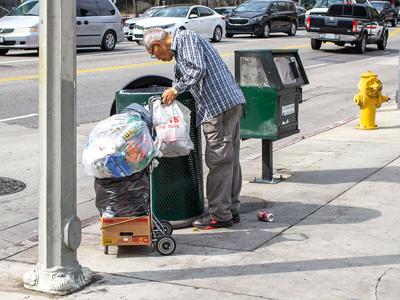When San Francisco Community Recyclers was evicted from the Safeway parking lot at Market and Duboce streets in 2013, reactions were mixed. Some neighbors cheered, overjoyed not to be awoken in the middle of the night by the jingling of shopping carts filled with glass bottles rolling down the sidewalk. Others were concerned; another big recycling drop-off in Golden Gate Park had closed the year prior, leaving those who scavenge for bottles and cans few places to redeem them for cash.
Since those two closures, recycling collectors have trekked farther afield, often lugging huge bags onto Muni to drop off at rePlanet locations in Portola, Balboa Park, or Bernal Heights. But on Tuesday, rePlanet said that it was shuttering all 284 of its locations in the Bay Area, effective immediately. More than 700 employees were laid off. rePlanet president David Lawrence told San Jose Mercury News that rising costs of operating the business combined with lower prices for redeemable aluminum and plastic were to blame for the decision.
At the same time, legislation mandating recycling is on the rise — but San Francisco appears unprepared to meet these goals. Last month, news broke that the city was denied $3 million from the federal government for a mobile recycling program, designed to fill the gap left by shuttered recycling sites.
It was a big blow, particularly for small businesses who — under the state’s 1986 Bottle Bill — are required to accept and redeem bottles and cans if there are no recycling centers nearby. For small corner stores with limited real estate, this option is unfeasible, but so is the $100 a day fine for not redeeming recyclables.
Despite being rejected for the $3 million grant, the San Francisco Department of the Environment is still looking for ways to launch the mobile program. “We are still moving forward with plans,” Peter Gallotta, the public relations a policy coordinator for the San Francisco Department of the Environment, tells SF Weekly. “Before launching such a program, the city must apply for pilot status through CalRecycle and we are currently taking the necessary steps for approval. Right now our expectation is that we will be able to launch a mobile recycling pilot in 2020.”
With rePlanet’s announcement, the pressure is on. For now, there are still a couple centers left along the edges of the city — Our Planet Recycling on Bayshore Boulevard, which is accessible through the 9-Bayshore, and a small can recycling spot in the parking lot of Pacific Supermarket on Alemany Boulevard, which is walkable by BART.
While the closures of the recycling centers will undoubtedly impact those who rely on collecting cans and bottles to help pay their bills, it also raises a red flag for the future of recycling in the Bay Area, because even if there are recycling centers to receive items, there’s not necessarily anywhere to send them. Recology, San Francisco’s main recycling plant, handles 700 tons of curbside recycling each day — but in the wake of China banning recycling imports, is having a difficult time finding people to process it.
The infrastructure around recycling in San Francisco is crumbling. So while people joke about the plastic straw ban, or the recent decision not to allow vendors at San Francisco International Airport to carry plastic bottles of water, with the latest wave of recycling center closures it appears that taking steps to reduce the amount of recyclable waste we use overall may be the best option.









